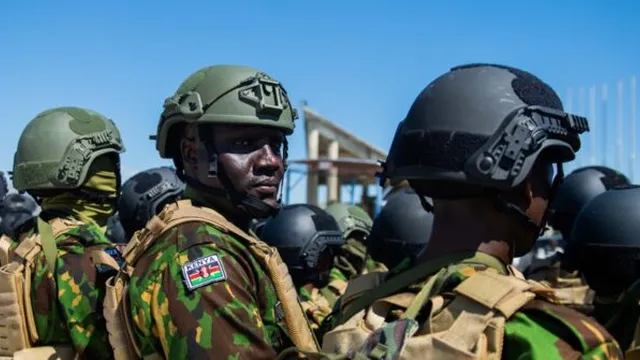
Kenyan police officers injured in violent clashes with gangs in Haiti
2025-04-03 04:27- Two Kenyan police officers were injured in clashes with gangs in Port-au-Prince.
- One officer who went missing has been confirmed dead, marking the second fatality for the Kenyan peacekeeping mission.
- The situation highlights the ongoing struggle for security in Haiti, with gangs controlling a majority of the capital.
Express your sentiment!
Insights
In Port-au-Prince, Haiti, recent clashes between Kenyan police officers and local street gangs have resulted in serious injuries to two officers. During these confrontations, one officer sustained a gunshot wound to the head, while another was struck in the ear by a bullet that penetrated the armored vehicle they were using. The two injured officers have since been evacuated to the Dominican Republic for medical treatment. Additionally, one Kenyan officer who was reported missing in operations last week has been confirmed dead, making him the second casualty among Kenyan peacekeepers in Haiti. The ongoing violence in Haiti can be attributed to gangs controlling approximately 80% of Port-au-Prince, making it one of the most dangerous locales globally for law enforcement. As the Kenyan police force is part of the U.N.-authorized Multinational Security Support (MSS) mission dispatched to Haiti in June, these incidents highlight the dangerous situation they face as they attempt to restore order. The MSS mission has struggled to reduce gang control in Haiti, and dissatisfaction is rising within the police ranks due to inadequate protective measures. Concern over the quality of equipment provided, including vehicles that are failing to protect officers, prompted the MSS officials to seek assistance from Washington. Despite the hazards, many journalists continue to report on the unrest, risking their lives in a country where gangs frequently target media personnel. In March, several journalists were attacked, and two even lost their lives amidst the increasing hostilities, which have led to a pervasive atmosphere of fear among those who cover such violence. The brutality faced by journalists, alongside the challenges faced by peacekeepers, underscores the dire situation in Haiti and the significant hurdles to achieving stability in the region.
Contexts
The impact of gangs in Port-au-Prince has been a critical issue affecting the social, economic, and political landscape of Haiti. Gangs have increasingly become influential entities within communities, contributing to a cycle of violence and instability that thwarts development and recovery efforts. The rise in gang activity can be attributed to several factors, including poverty, political corruption, and the lack of effective governance. Many young individuals are drawn into gangs due to limited economic opportunities and the promise of power and belonging that these groups offer. This recruitment often perpetuates a culture of violence that hinders community cohesion and safety, leading to a pervasive sense of fear among residents. As gang territorial disputes escalate, violent encounters become commonplace, further destabilizing neighborhoods and undermining trust in local authorities. Uncontrolled gang violence has resulted in numerous casualties, often involving innocent civilians caught in conflicts, creating a humanitarian crisis that calls for immediate action. The disruption caused by gang activities extends beyond physical violence; it encompasses humanitarian issues such as displacement, as families flee gang-controlled areas in search of safety. Furthermore, the provision of essential services, including healthcare and education, is severely hampered in gang-affected regions, leaving communities increasingly vulnerable and neglected. The economic ramifications of gang influence are equally alarming. Businesses, particularly small and medium enterprises, face extortion and threats, leading to a decline in local commerce and investment. The insecurity caused by gangs has deterred foreign investments and strained economic growth, exacerbating poverty levels in an already struggling economy. Furthermore, the lack of effective law enforcement responses has fostered an environment where gangs operate with relative impunity, further entrenching their power. Consequently, international aid and support have become critical in addressing these challenges, as local capacities remain overwhelmed. Addressing the impact of gangs in Port-au-Prince requires a multifaceted approach that incorporates law enforcement, community engagement, and socio-economic development initiatives. Strengthening the judicial system and enhancing the capacity of law enforcement agencies to effectively tackle gang violence is crucial. Additionally, implementing community-based programs that provide alternative livelihoods and education for youth can help reduce gang recruitment. It is also essential for the Haitian government to engage with local leaders and communities to build trust and develop strategic interventions that empower residents. International support should focus on promoting stability and sustainability, aiming not just to suppress gang activity but to eradicate its root causes by providing opportunities for growth and development. Ultimately, the path to a safer and more stable Port-au-Prince lies in collective efforts to transform the socio-political environment and restore faith in institutions.